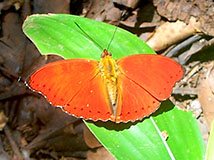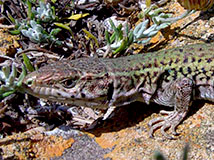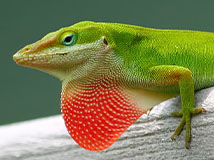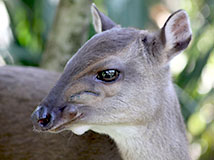|
Welcome to the Lab of Dr. Nicola Anthony
Research in the Anthony laboratory is focused on understanding the role of history, landscape and ecology in shaping evolutionary diversification. Our research seeks to address both the fundamental micro-evolutionary processes underlying biological diversity in the tropics, as well as understand how the loss of genetic variation might ultimately compromise population viability and fitness. These are questions of key importance to conservation biology and evolutionary research, yet they have rarely been addressed in natural populations. Much of our initial work has focused on examining the impact of Pleistocene climate change and riverine barriers on genetic structure and speciation in Central African gorillas and forest antelope. In tandem with this work, we have also sought to examine a perplexing problem in the use of the mitochondrial DNA in vertebrate population genetics: the insertion of mitochondrial DNA fragments in the nucleus (or Numts). This project not only aims to understand the rates and patterns of insertion of mitochondrial control region fragments into the nuclear genomes of African great apes, but also assess their utility as genetic markers in their own right. We have recently begun a major collaborative project to prioritize areas for conservation based on genome-wide patterns of adaptive evolutionary potential in a wide range of Central African tropical taxa. This project also seeks to develop a prioritization scheme for protected areas that is both evolutionarily-informed and interdisciplinary in nature, integrating data from the biological, environmental, and social sciences. As a result of this and earlier work in Central Africa, we have developed partnerships with universities and institutions in Central Africa, the United States, and Europe, and through these partnerships seek to promote collaborative research and education capacity building in Central Africa. Finally, we are also interested in understanding how habitat fragmentation impacts adaptive genetic variation and immunity in island reptiles of the Aegean. Using a large suite of land-bridge island populations of a common lacertid lizard, we are exploring the relationships between island history, genetic variability, and functional assays of immunity to test the hypothesis that loss of adaptive variation compromises disease resistance. Part of this work involves the characterization of candidate immunity genes for which we are using the green anole as a reference model. Here at our laboratory website, you can find out about the projects we are involved in, the people who are making them happen, and the results from our research. Within these tabs, you can find information about Dr. Anthony and the people who make up her research team, as well as news about the latest developments in our laboratory group. As this site grows and develops, we will be regularly updating it with information on projects past and present. We hope that you enjoy this site and find it useful and informative. If you have any questions about its design please contact Nicky Anthony ([email protected]) or the relevant lab member indicated on the web site. |
Current Lab News
July, 2019. CAB-Alliance ran a series of policy presentations on research findings from this international collaborative effort. November 7, 2018. Congrats to Courtney for successfully defending her thesis! July 1-8, 2018. ECOTROP field school at the Lopé National Park in Gabon. June 14, 2018. Congrats to Courtney for getting her first thesis chapter accepted in PLOS ONE! Working with collaborators at the University of Buea, Pittsburgh, Drexel and Tulane, this paper details the distribution and diversity of chytrid fungus lineages in Cameroon under present and future climate change: http://journals.plos.org/plosone/article?id=10.1371/journal.pone.0199288 May 16-18, 2018. The Anthony lab hosted a Cyverse (www.cyverse.org) and Software Carpentry (https://software-carpentry.org/) bioinformatics workshop on the UNO lake front campus last month. Thanks to our instructor Jason Williams from the CyVerse DNA Learning Center for an incredible introduction to practical computing and bioinformatics. Over 25 faculty and students from local institutions attended! May 15, 2018. Congratulations to undergraduate researchers Kaleb Hill and Gina Kissee on their graduation from UNO! |




